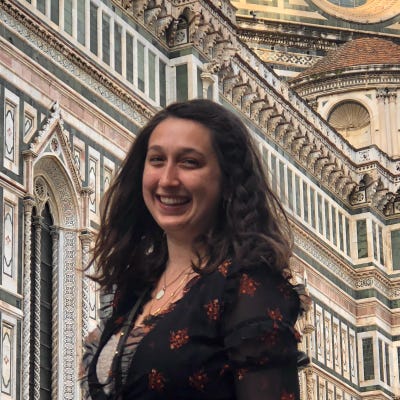At GoodSam, regenerative agriculture isn't just an environmental movement—it's a business decision
GoodSam Foods founder Heather Terry explains the importance of regenerative agriculture and the value of people and partnerships in this Q&A.
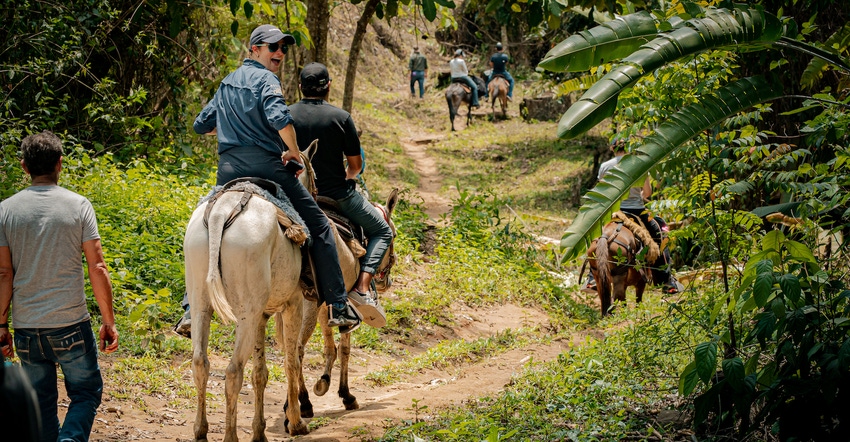
A natural products industry veteran of more than a decade, Heather Terry is doing with GoodSam Foods what she always set out to do: create healthy chocolate through an equitable supply chain while not taking away from the earth's resources. Terry is intentional in every decision she makes for her CPG business, GoodSam. Her philosophy is that if the decision is for the benefit of the planet and its inhabitants, then it will ultimately help advance GoodSam.
GoodSam's mission centers on regenerative agriculture and direct trade. GoodSam does not present itself as a candy or snack brand, but as a small farmer brand. Terry's view is that regenerative agriculture does not start with the soil but with the people caring for it. The brand strives to ensure that farms endure for generations by investing in these people. She knows the farmers in Colombia who grow the cacao for GoodSam's chocolate and pays attention to what they say they need to succeed.
"I get that the world's moving and changing, but we've got to return to the basics: the planet, soil, people, relationships and action. Those are the basics. If every company started coming from that standpoint, it would be a very different food system. It would be a very, very different world," Terry says.
To get a foothold in Colombia, GoodSam partners with Luker Chocolate, a Colombian chocolate manufacturer that locally produces single-origin chocolates from bean to bar. Colombia has a rich and diverse landscape, but years of war and drug trafficking have made accessing the country's unique resources and supporting the farmers difficult for foreign companies. Terry says the partnership with Luker has been instrumental in helping them connect with small farms.
"When you go in with a partner like this, you have to have a certain element of trust, and Luker Chocolate has been tremendously helpful to us and our efforts on the ground. They are what I would classify as a true vertically integrated partner. For GoodSam, we could not do the work that we do in the country of Colombia without them."
Together, Luker and GoodSam created the Building Networks program to help close the digital divide in Colombia. The program provides Colombian youth the educational resources and English language skills and teaches them how to use social media for good. This investment helps deepen relationships with the farmers and supports the community's growth. In addition, GoodSam, with Luker's support, continues to create farmer-driven initiatives that benefit the land, the people and the future of food.
New Hope Network spoke with Heather Terry to learn more about GoodSam and Luker's partnership and how the brand continuously supports its farmers who have been practicing regenerative agriculture for generations. Some answers have been edited for length and clarity.
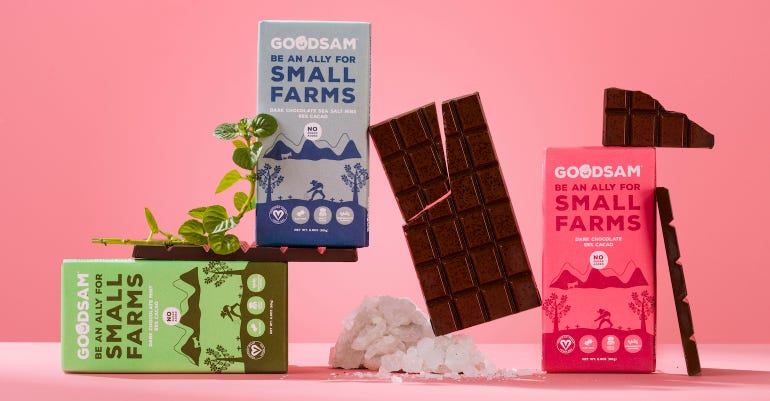
How did this Building Networks program come to fruition?
HT: We were in a part of the country called Necoclí, where Luker operates pretty extensively, and we met a young man spearheading many social media efforts in that area. We do a lot of work in the field, and I could see how he was trying to show the beauty of what was there, what his parents were creating and what his family was cultivating. These kids are really eager to connect with the outside world. They want to continue the legacy of their families; they want to represent their communities. If they're disconnected, that's difficult for them to do because the world is so connected now.
So, the program's premise became to teach them how to use social media as an effective business tool to represent what their families, their farms and their small businesses are doing. Some of them in this program have CPG companies that they're trying to get off the ground in Colombia. [Our goal is to] teach them how to use it effectively—to not just take selfies of themselves. We show them how social media can be used as a real force to create growth, revenue and drive. It also gives them some practical basis for using English. This helps give them another way to connect to the outside world.
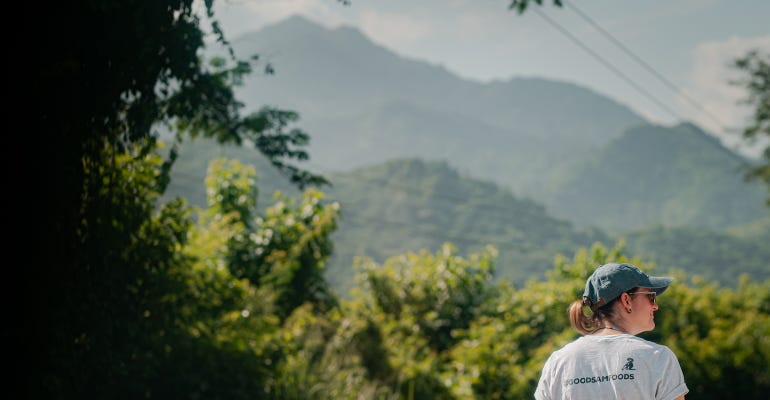
You work in other countries as well, not just Colombia. Is this sort of program scalable?
HT: Every country is different, and every region within a country is different. So even in Colombia, this is not our only project running there. We are always looking at the need of the different communities, and I think that's the difference with us.
On the eastern side of the country, we revamped a school, put in a power line, built roads and partnered with the local community to do so. So you have to listen to what they need and how they need it in order to make it work in the long term. That way, they can actually maintain it once we leave.
Often when we think about these types of programs, groups are really hell-bent on their efficiencies and say this is what we do. GoodSam does whatever our communities need to grow. For instance, we came to a community in the middle of the country with our direct trade program. We told them, "We have this much money, and here's what we are thinking of doing with it. What do you think?" And they told us that would not actually be useful to them but what they were struggling with was that they had a lot of cadmium in their products. They said, "We don't know where to sell our products [because of different countries' cadmium limits]. Can you help us build a cadmium lab for testing?" And so that's what we did.
People often think, "Wow, Heather, you're so nice; look at all these great things you do in the world." I am a capitalist at heart. I'm a conscious capitalist. For me, philanthropy and impact are two very different things. Impact is something that continues. Impact is something that grows something. Philanthropy is just a handout, and I'm not interested in that. I'm interested in growing the business of GoodSam and the business of our farmers so they can keep up with us.
Would your advice be for other companies not to build one-off products but rather build systems?
HT: Yes, exactly. This is the new way of doing business. You can't ignore communities anymore. We're losing farmers not just in places like Colombia, but all over the globe, including the United States. Unless we're willing to show up and treat the people who grow our food with respect, dignity and the tools to continue, major food companies will be struggling in 20 or 30 years. So, companies like GoodSam (and many others in the natural products industry) are paving the way for a new paradigm in business and a new class of companies that will help take food into the next shift.
How do you work with local farmers to produce things that help grow your business and simultaneously help to grow their business?
HT: Through regenerative agriculture, sustainability and by not mono-cropping. We cross categories, so our coffee and cacao grow together; our macadamia, coffee, avocado oil and mangoes all grow together in Kenya. We take from the whole system. So, it's not just about biodiversity, and it's not just about soil preservation. It's not just about the carbon—it's also about the people. We now really do provide a year-round revenue stream to these farmers. In our food system, it is important to create an entire business out of it, where farmers are not being taken advantage of but are being respected and poised for growth.
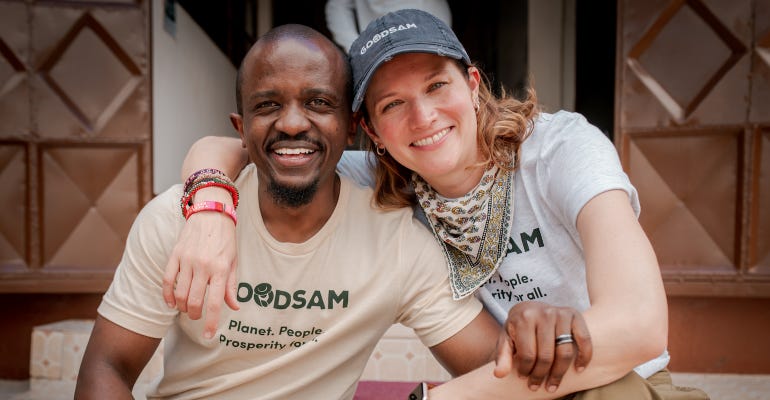
How does GoodSam employ transparency in communicating with the farmers?
HT: Luker tells the farmers when buying their crops that the crops are going to GoodSam. We're always collectively at the table with Luker. We're never separate from them in that action. Luker always ensures that the farmers understand who's purchasing these products. So buying is number one.
The second thing is we keep showing up. I'm in Colombia now four to five times a year on a regular cadence. They get really excited because the more we're there, the more invested we are in them.
What do other brands, investors or consumers need to know about sustaining our future food system?
HT: U.S. consumers, investors and the whole community—even the natural products industry—must understand that there's real human capital here. We make these investments not only to invest in our business's growth but for the future of food. So we must create these impact moments around these communities that can truly grow.
I really believe it is a collaborative effort to create an impact. Impact requires all of us stakeholders, Luker, GoodSam and the farmers, to come together to say we believe in this community. We believe it's worth putting in this capital, this program, this infrastructure, this physical structure, whatever it is right there to grow this community. We believe this because we see possibilities for our businesses and this community forward. And that can't be undervalued.
Read more about:
J.E.D.I.About the Author(s)
You May Also Like

